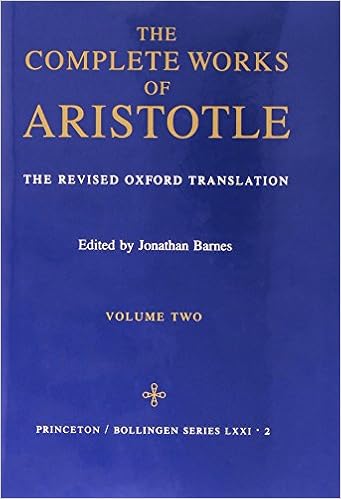
By Victoria Wohl
ISBN-10: 1107050499
ISBN-13: 9781107050495
This quantity explores the conceptual terrain outlined by means of the Greek notice eikos: the possible, most likely, or moderate. A time period of paintings in Greek rhetoric, a defining function of literary fiction, a seminal mode of historic, clinical, and philosophical inquiry, eikos used to be a manner of considering the possible and inconceivable, the actual and counterfactual, the hypothetical and the genuine. those 13 unique and provocative essays learn the believable arguments of court audio system and the 'likely tales' of philosophers, verisimilitude in paintings and literature, the possibility of resemblance in human copy, the bounds of human wisdom and the chances of moral and political service provider. the 1st artificial research of probabilistic pondering in historical Greece, the amount illuminates a desirable bankruptcy within the heritage of Western proposal.
Read Online or Download Probabilities, Hypotheticals, and Counterfactuals in Ancient Greek Thought PDF
Similar greek & roman books
Download e-book for iPad: Beginning of Knowledge by Hans-Georg Gadamer
During this paintings Gadamer reminds us that philosophy for the Greeks was once not only a query of metaphysics and epistemology yet encompassed cosmology, physics, arithmetic, medication and the total succeed in of theoretical interest and highbrow mastery. while Gadamer's booklet "The starting of Philosophy" handled the inception of philosophical inquiry, this publication brings jointly the majority of his formerly released yet by no means translated essays at the Presocratics.
New PDF release: Gorgias (Clarendon Plato Series)
The Gorgias is a brilliant creation to primary difficulties of ethical and political philosophy. In solution to an eloquent assault on morality as conspiration of the vulnerable opposed to the powerful, Plato develops his personal doctrine, insisting that the advantages of being ethical continuously outweigh any advantages to be received from immorality.
Download PDF by Diego E. Machuca: New Essays on Ancient Pyrrhonism
Scholarship on old Pyrrhonism has made large advances over the last 3 many years, thank you particularly to the cautious reexamination of Sextus Empiricus extant corpus. development in this momentum, the authors of the 8 essays accrued right here research probably the most vexed and fascinating exegetical and philosophical questions posed by way of Sextus presentation of this type of skepticism.
Download PDF by Aristotle: The Complete Works of Aristotle (The Revised Oxford
The Oxford Translation of Aristotle was once initially released in 12 volumes among 1912 and 1954. it really is universally well-known because the typical English model of Aristotle. This revised version includes the substance of the unique Translation, a bit of emended in mild of contemporary scholarship; 3 of the unique models were changed by means of new translations; and a brand new and enlarged choice of Fragments has been extra.
- Schattenprinz. Roman (Vampire Empire)
- Plotinus and Epicurus: Matter, Perception, Pleasure
- Bridging the gap between Aristotle's science and ethics
- The Giants of Pre-Sophistic Greek Philosophy: An Attempt to Reconstruct Their Thoughts
- Protagoras
- Contemporary essays on Greek ideas: the Kilgore festschrift
Additional resources for Probabilities, Hypotheticals, and Counterfactuals in Ancient Greek Thought
Sample text
15 So, for example, Ferrari tells us that ‘Socrates’ riposte to Teisias’ parry is dismissive . . 17 Certainly, there is good reason to assume a connection between the two passages. The discussion of Tisias’ teachings on to eikos was introduced in response to a worry that Socrates was setting the bar too high in suggesting that only the man fully trained in psychology and dialectic could achieve the science of persuasion (271c10–272c4). 18 Both 273d2–6 and 261e6–262c3 share the context of a refutation of the claim that persuasion can be achieved without knowledge.
I designate them both explicit eikos arguments – arguments where the word eikos or a close cognate occurs. 3 Judging solely from Plato’s account, Tisias taught pupils to lie in court and to use a well-known traditional type of eikos argument, hardly enough to give him the reputation for innovation and originality he later possessed. Aristotle, however, presents a different version of this same case, which he attributes to Corax, and his version is more interesting. In the Rhetoric Aristotle cites an example of a case where the likely is in fact not likely (1402a18–23): ἄν τε γὰρ μὴ ἔνοχος ᾖ τῇ αἰτίᾳ, οἷον ἀσθενὴς ὢν αἰκίας φεύγει (οὐ γὰρ εἰκός), κἂν ἔνοχος ᾖ, οἷον ἰσχυρὸς ὤν (οὐ γὰρ εἰκός, ὅτι εἰκὸς ἔμελλε δόξειν).
30 Eikos in Plato’s Phaedrus 31 to be more honoured than truths’ (pro t¯on al¯eth¯on ta eikota eidon h¯os tim¯etea mallon). 3 This passing reference to to eikos is rightly connected to the more extensive discussion found later in the Phaedrus, at 272d2–274a5. This later discussion serves to elaborate the critique of the sophistic analysis of arguments from likelihood as indifferent to truth. Such arguments are apparently tailored to the beliefs of their audience and the need to persuade, with no regard for the truth of the matter.
Probabilities, Hypotheticals, and Counterfactuals in Ancient Greek Thought by Victoria Wohl
by George
4.3



